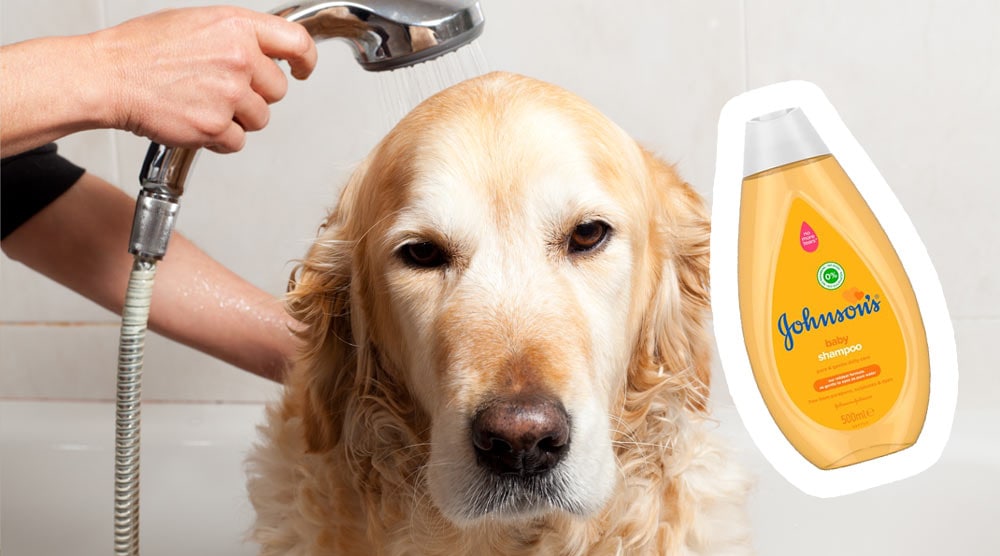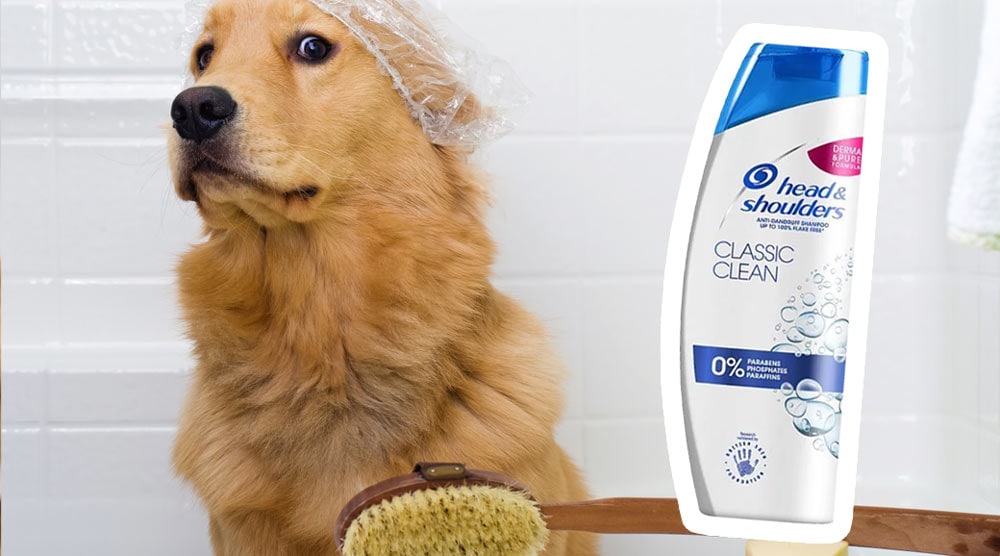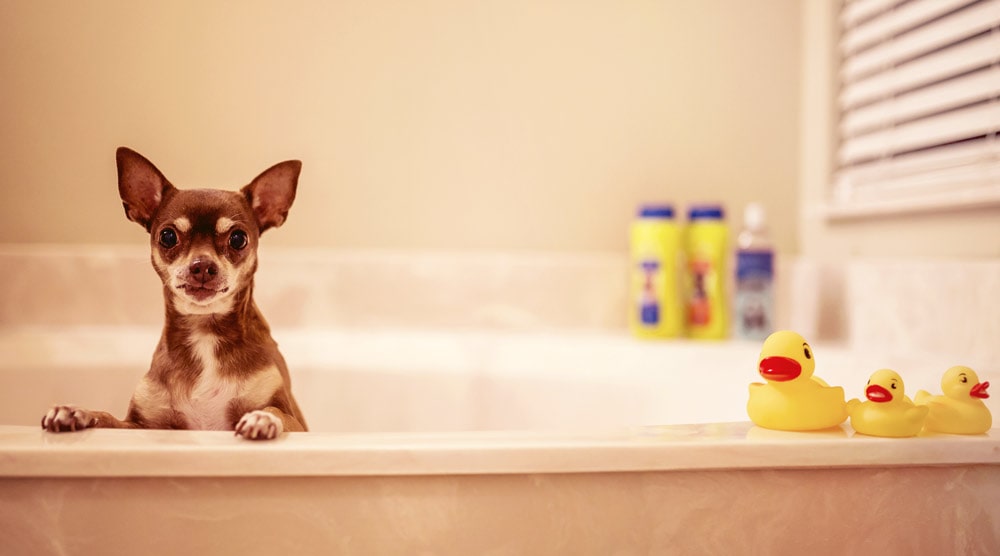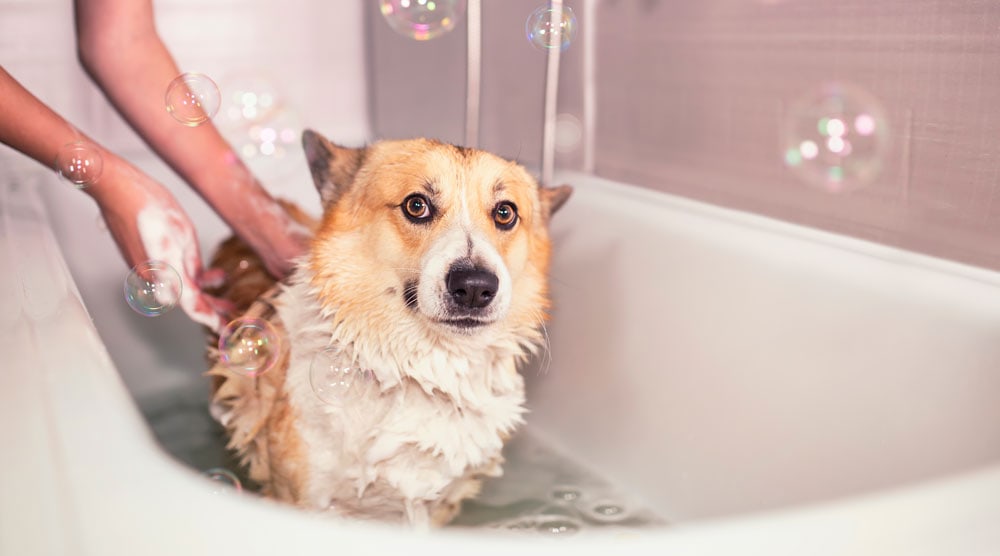Bathing your dog with a baby shampoo might seem like a safe choice. After all, the formulas are usually gentle and designed for delicate skin. In this article, I explain why human shampoos, even baby formulas, aren’t recommended for washing a dog.
Contents
A gentle baby shampoo that contains no artificial fragrances or harsh chemicals may be safe to use on your dog in emergencies. As these shampoos aren’t designed for dogs, however, they may disrupt your pet’s natural skin pH balance – especially if used regularly.
Let’s take a closer look at why it’s better to avoid using human shampoos, including baby formulas, on your dog.
Note: This article has not been written by a veterinary professional. If you have concerns about which shampoo you should use for your dog, especially if they have a skin condition or problem, you should always consult your vet.
Is Baby Shampoo Safe to Use on Dogs?
As I mentioned in the introduction, it’s best to avoid using human shampoos on your dog.
That’s because they may contain ingredients that are safe for humans, but harmful to dogs. Human shampoos also include harsher chemical ingredients that could irritate your dog’s skin.
What about using baby shampoos when washing your pooch though?
It’s true that baby shampoos are usually gentler and contain minimal ingredients. Baby shampoos, for example, use longer chain cleansing surfactants, which minimises the chance of the shampoo causing irritation to the skin or eyes. The trade-off is that baby shampoos tend to be less effective – especially when it comes to cutting through oils and grease.
While it’s unlikely that an occasional wash with baby shampoo will be harmful to your dog, these shampoos are not pH balanced for your dog’s skin. This includes popular options, like Johnson Baby Shampoo.
Dogs have a naturally more alkaline skin pH level than humans. Regularly washing their coat with a more acidic shampoo could disrupt the ‘acid mantle’ of your dog’s skin. This is the protective barrier that helps to prevent bacteria, viruses and other impurities entering into the system. It could also cause their skin to become dry and irritated.
Dog Shampoos Have Many Benefits for Canines
Aside from the potential downsides of using a baby shampoo on your dog, your pet may also miss out on the benefits of a dog shampoo.
Baby shampoos are designed to be gentle, for example, so you may find they don’t lather or clean as well as a traditional dog shampoo. Human shampoos are designed for daily use, while dog shampoos are formulated to be used much less frequently.
Many dog shampoos also contain ingredients that are beneficial to canines. These include moisturizers to prevent dry skin and ingredients to reduce shedding. A baby shampoo probably won’t contain the same beneficial substances – at least not in optimal quantities for your dog.
If you choose to use a baby shampoo for bath time, check that it has natural ingredients and doesn’t contain artificial fragrances, colors or preservatives. You should only use it to wash your dog every few months, rather than on a regular basis.

What About Medical Shampoos?
If your dog suffers from allergies, infections or other skin conditions, you should always consult your vet. Your dog may need a medicated dog shampoo or other treatments. Common examples include antibacterial, hypoallergenic and antifungal shampoos.
It’s vital that you only ever use medicated shampoo that has been designed for dogs. Human medicated shampoo could be dangerous to your pet.
What About Using Baby Shampoo to Wash a Puppy?
Puppies have even more sensitive skin than adult dogs. Their coat is also more delicate than it will be once fully grown.
For this reason, I recommend only using a specially-formulated puppy shampoo when bathing a young dog – not a baby shampoo.
When selecting a puppy shampoo, look for natural, minimal and transparent ingredients. Again, it’s important to steer clear of harsh chemical cleansers, as these can irritate a young dog’s skin. It’s also best to avoid artificial fragrances, colorings and preservatives, which are unnecessary for cleaning a dog’s coat but may trigger a reaction.
What About Adult Human Shampoo?
Adult shampoo shouldn’t be used on a dog, partly because they are not formulated to match the pH level of a dog’s skin. These shampoos are also more likely to include harsh or potentially dangerous ingredients than baby shampoos.
Essential oils are a good example. Some essential oils are safe for dogs in diluted amounts, but others can be irritating or even poisonous. Examples of problematic essential oils for dogs include Sweetbirch, Pennyroyal and Pine Oil.
A regular human shampoo is also more likely to include artificial colors, fragrances, and harsh sulfate cleansers that are linked to skin irritation. All these ingredients are best avoided in a dog shampoo – especially as they could be present in stronger quantities in human shampoos.
Dogs also have thinner skin than humans. They usually have a layer of 3-5 skin cells, whereas human skin tends to be around 10-15 cells thick. This means dogs have naturally more sensitive skin that’s more prone to irritation.
Tip: Want to learn more about choosing the best shampoo for dogs? Click here to read our complete guide to shampoos for dog owners.
Conclusion
While baby shampoos are often safer for dogs than adult human shampoos, it’s still best to stick with a high-quality shampoo designed specifically for dogs.
Dog shampoos are designed to match a dog’s skin acidity, which is vital for a healthy skin barrier. They also have dog-safe ingredients and may provide additional benefits, such as shedding control.
Do you have any questions about using a baby shampoo on your dog? Please let me know in the comments section below.




